Transport Week – Smart Ports and LNG in SeaPorts
The third day of the Transport Week conference the presentations were focused on synergies and opportunities for LNG in Ports and smart and digitalized ports.
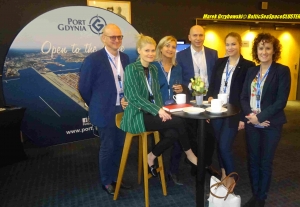
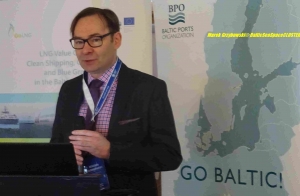
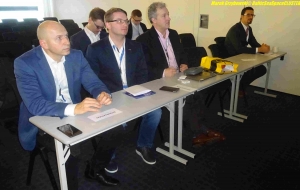
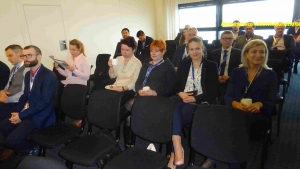
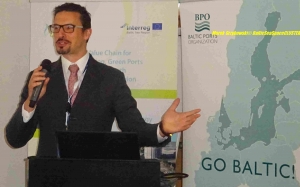
Guidance on LNG Bunkering to Port Authorities and Administrations has been widely presented by
Ricardo Batista, Project Officer, EMSA, including the methodology and procedures for LNG bunkering. Issues concerning an implementation of LNG as a fuel is a subject presented by Dr. Eng. Stefan Jankowski,Maritime University of Szczecin. Abaut synergies and opportunities for LNG in ports was Dr. Lawrence Henesey, Assistant Professor, Blekinge Institute of Technology presentation. Michał Daczuk, Project Manager, Port of Gdynia was informed about LNG bunkering systems in the Port of Gdynia. A comparison of operational, commercial & technical aspects Ship-to-ship vs. Truck-to-ship of LNG bunkering was discussed by Jan Schubert, Senior Manager, Nauticor. About benefits of LNG as fuel for logistic chain at road and sea informed Karol Wieczorek, Regional manager, Cryogas.
The ninth edition of the Transport Week conference concluded 7 March in Gdynia, Poland. The conference, which took place on 5-7 March, 2019, focused on topics related to the state of the market of the port industry and current and upcoming port investments, as well as the innovative processes which will drive the development of the port sector in the future. Second day’s focus was the ongoing digitalization of the port industry. Isabelle Ryckbost (ESPO) stated that digitalization is well on its way to disrupt the way we do business today. It affects multiple areas of port activities, impacting safety and security, while also enhancing environmental performance. It is a very efficient way for information sharing between various stakeholders and helps to pave the way for automation. That said, data sharing is a process built on trust. Ryckbost mentioned ports as the ideal, neutral matchmakers, perfectly positioned to connect the parties involved in the logistics chain.
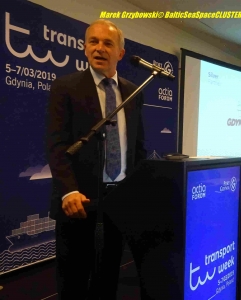
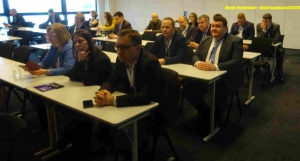
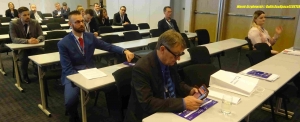
Sessions: Smart and digitalized ports was moderated by Kris Kosmala, Director Smart Port Operations Digital Services, Royal HaskoningDHV. Challenges and benefits linked to embracing digitalization in ports was presented by Isabelle Ryckbost, Secretary General, ESPO and about SMART Ports concept as a key to future development informed Kris Kosmala, Director Smart Port Operations Digital Services, Royal HaskoningDHV. In next session about tech-infused solutions for the maritime,rail, and road industries informed Przemek Myszka, Editor-in-Chief, Baltic Transport Journal. Technical i digital aspects of the precise mooring system using GBAS-RTK has presentation Wojciech Tycholiz, NavSim.
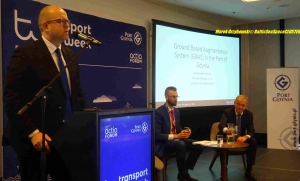
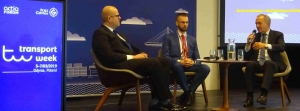
The ninth edition of the Transport Week conference concluded today in Gdynia, Poland. The conference, which took place on 5-7 March, 2019, focused on topics related to the state of the market of the port industry and current and upcoming port investments, as well as the innovative processes which will drive the development of the port sector in the future.
Second day’s focus was the ongoing digitalization of the port industry. Isabelle Ryckbost (ESPO) stated that digitalization is well on its way to disrupt the way we do business today. It affects multiple areas of port activities, impacting safety and security, while also enhancing environmental performance. It is a very efficient way for information sharing between various stakeholders and helps to pave the way for automation. That said, data sharing is a process built on trust. Ryckbost mentioned ports as the ideal, neutral matchmakThe Transport Week will return in March 2020 for its 10th anniversary, marking 10 years of discussions exploring the various elements governing the development of the transport industry and sharing of experience between parties active in every corner of this highly dynamic sector.ers, perfectly positioned to connect the parties involved in the logistics chain.
Phot: Marek Grzybowski
More information: http://www.transportweek.eu/
